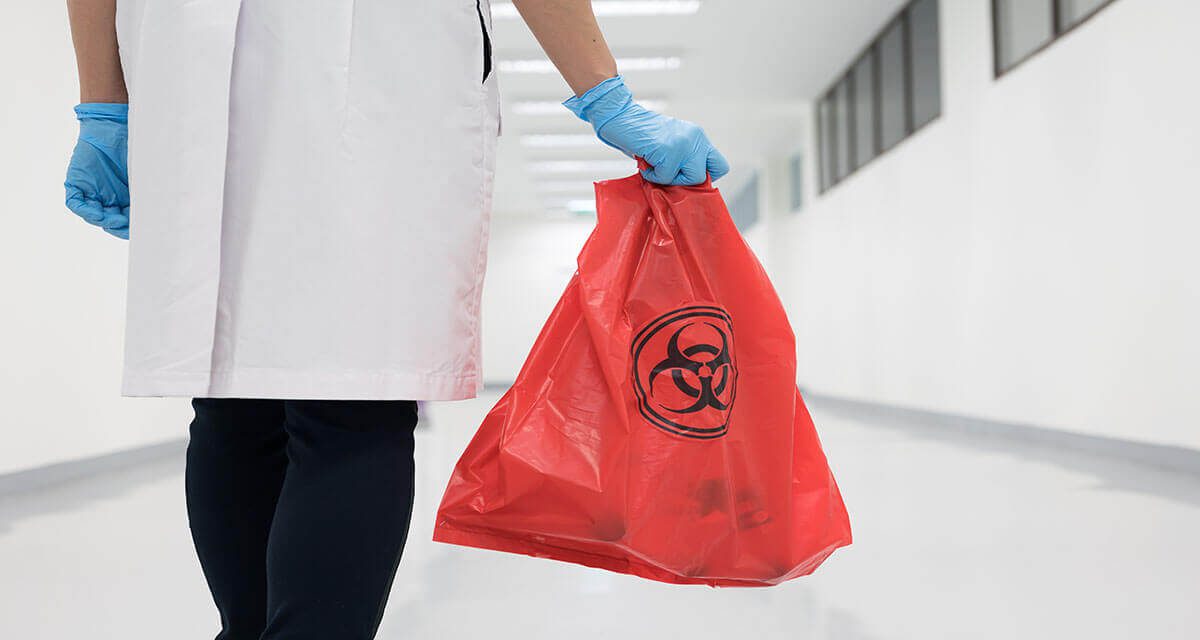Reducing waste in hospitals

As we can imagine, hospitals produce a lot of waste in order to keep their staff and patients safe. Hospital waste often produces waste which is one time use and usually includes some plastic. Some of this waste protects us and is inevitable. We want to explore the ways of reducing waste in hospitals to meet sustainability goals and policies.
Medical waste
Medical waste is considered to be one of the most important types of waste management. For reasons such as the amount of waste produced, and the safety management of medical waste.
Therefore, average waste avoidance and recycling tips are not always applicable. Safety and hygiene remains at the forefront of a hospital’s priorities.
The most common type of waste in hospitals is clinical waste, things such as plastic or pvc gloves, aprons, bandages. Due to the nature of medical waste, it can be several times more expensive to dispose of compared to domestic waste.
TriMedika explains that 1500 UK hospitals produced 2250 tonnes of PVC waste which had recycling potential (estimated). While we know hospitals and other healthcare providers face a sustainability challenge, we look at the other ways in which they can make their impact.
Nonhazardous waste
Some waste in hospitals can be unavoidable! Hospital staff must correctly dispose of medical waste. However, it is important to consider the general waste, created by employees, patients and visitors. Hospitals can focus on using recycling bins to easily reduce general waste with little effort and cost. Education is key!
If possible, recycling paper products, newspapers, memo’s and much more will be a great help. Digitisation can be a useful waste management tool, removing the regular use of paper and folders.
A great way to make improvements is to begin with your general waste. Take a look at paper, food, fabric and plastic waste before tackling medical waste issues.
Information
Taking the time to evaluate your current practices will help you understand what goes wrong and where. In hospitals, paper is the largest waste area! Which may come as a shock to most of us.
Start by taking a look at your overall ordering process, before breaking it down by department. To begin, place your usual order for one month. Looking at your regular order, you can see what is used, what is needed and what is wasted.
Looking at a micro level will let you know what products are more appropriate to order, and how much is needed while keeping standards high. For example, you may realise you need less magazines or less plastic cups.
Develop a plan
All the information from these previous steps will formulate a plan. Work with different departments, staff, and stakeholders. Get as many perspectives as possible and work on a feasible and realistic plan.
Small scale plans will help you with your wider waste goals. Develop easy and simple departmental plans and targets. This way, the goals seem more achievable, and you can rely on people to take on a small piece of a very large job.
Make sure to keep up to do with waste legislation and policies when creating or updating your plan.
Signage
Similarly, to being informed, signage is a great way to remind your staff, contractors and visitors about waste, and your plans. Create fun and interesting infographics, facts and statistics which are easy to see and digest.
Not only can you let people know how much waste they produce, but you can also use signage to implement your waste plan. For example, using signage over bins reminding people what they can and cannot recycle.
Try to remind staff and service users as much as possible to reduce their waste, encouraging good habits!
Waste audits
You have an action plan ready to go, and the best way to make this a success is to regularly check on results. Set up a specific team who are responsible for waste audits within their own departments, complete spot checks and stay on top of your plan. Create simple to use audit checklists to get everyone involved. Set up monthly or quarterly checks.
Staying on top of where the problems lie can really help you make regular and repeated progress though the whole year. Before you know it you have slashed your waste in half!
Reusable products
Reusable items are a key item in sustainability. You can try using metal cutlery in canteens for example. Washing patient gowns and bedding at high temperatures instead of using disposable bed products, or glasses instead of plastic water cups. While these ideas can serve a sustainability goal, they can be time consuming for staff. It is important to consider how these changes affect staff, their time and what they can manage on shift.
Your plan
It is important to take all waste management tips and mould them into your own plan. Each hospital, patients and employees circumstances are different. With all these differences, waste management will look different to hospitals across the country. Work with what you have, and even the smallest successes in waste management add up quickly! Prioritising reducing waste in hospitals across the country is the next step for waste management.
 Read more from us…
Read more from us…
Understanding NHS waiting times
How to easily fold a fitted sheet
Sources
- https://bwaste.com/resources/the-knowledge-center/articles-insights-and-updates/waste-reduction-tips-hospitals
- https://www.wastecare.com/Articles/Waste_Reduction_Recycling_Tips_Hospitals.htm
- https://trimedika.com/how-we-work-together-to-reduce-plastic-waste/
- https://www.healthcaredive.com/news/9-ways-to-cut-down-on-medical-waste/422468/



